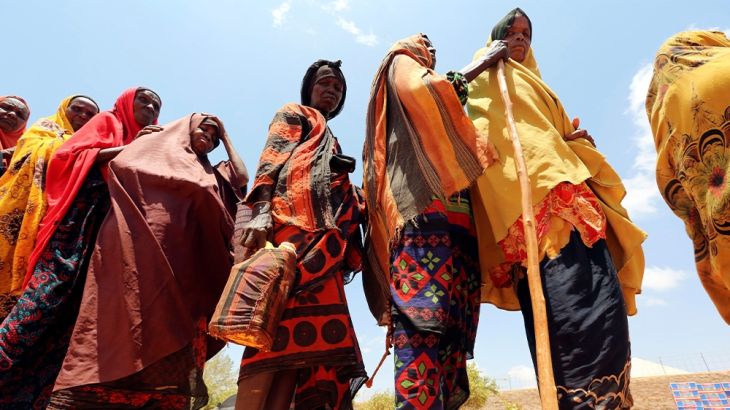UN warns 2 million people in Somalia at risk of starvation
Drought, al-Shabab violence send thousands of Somalis to Baidoa, putting centuries of nomadic way of life at risk.

The United Nations is warning some two million people in Somalia are at risk of starvation, amid the country’s worst drought since 2011, and is calling for more support from the international community.
Speaking at the end of a two-day visit to the country, UN Under-Secretary-General Mark Lowcock said decades of conflict and a lack of investment had undermined Somalia’s ability to cope with repeated humanitarian crises, even as droughts became more frequent and intense and the rainy season triggers recurring floods.
Keep reading
list of 4 items‘Mama we’re dying’: Only able to hear her kids in Gaza in their final days
Europe pledges to boost aid to Sudan on unwelcome war anniversary
Birth, death, escape: Three women’s struggle through Sudan’s war
The UN’s most recent food security analysis showed the April to June harvest was the worse since 2011 thanks to poor and erratic rains, which were followed by flooding, it said in a statement.
“Up to six million people are now projected to be food insecure over the coming months,” Lowcock said. A third of them will be severely food insecure without sustained aid.” Climate change-related events would also continue to have “deleterious effects” on the country’s humanitarian situation, he added.
Some 2.6 million people have already been forced from their homes as a result of natural disasters, as well as conflict, the UN statement said.
|
|
The latest crisis comes with many people, who have for centuries lived their lives as nomadic farmers, still struggling to recover from the ravages of prolonged drought in 2017 that brought the country to the edge of famine.
Need outstrips resources
Lowcock led a group including senior officials from the World Bank to Baidoa in southwest Somalia, where some 360,000 people have fled drought, terrorist attacks and armed conflict in the past three years, finding refuge in 435 sites around the city.
Al Jazeera’s Mohammad Adow, reporting from Baidoa, said people were continuing to arrive in the city, and the population of the displaced now outnumbered the city’s original inhabitants.
Aid workers said more assistance was needed.
“The numbers of those in need keep growing by the day and far outstrip the resources we have,” Save the Children’s Mohammed Noor Mohammed told Al Jazeera. “The donors are trying their best, but we never seem to be able to catch up with the growing number of displaced.”
Some of the people in Baidoa said they had fled the violence of al-Shabab fighters and were fearful their children would be forced to join the armed group. Al-Shabab has been fighting for more than 10 years to topple Somalia’s fragile government, which is backed by a 20,000-strong African Union force.
The UN says humanitarian assistance needs to be accompanied with more sustained peacebuilding efforts across Somalia and is working with the government to address the effect of repeated cycles of disaster.
“Conflict and marginalisation perpetuate drivers of fragility and fuel displacement,” said Oscar Fernandez-Taranco, the UN’s Assistant Secretary-General for Peacebuilding Support, who was part of the team that visited Baidoa.
“A sustained humanitarian response must be combined with government-led development and peacebuilding approaches to promote reconciliation and to assist people to rebuild their country.”